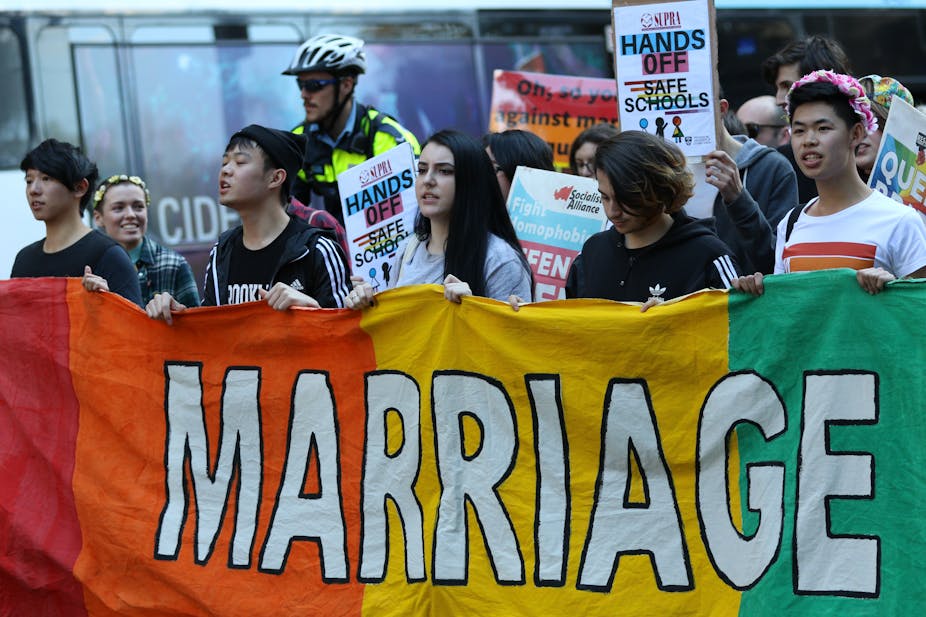Recently I spoke on a panel at a city law firm on same-sex marriage. At the conclusion of the discussion the audience, predominantly young gay professionals, voted by more than two to one that they would prefer to wait rather than hold a plebiscite to achieve changes to the Marriage Act.
It appears increasingly likely that this view is shared by Labor, and the plebiscite will founder due to opposition in the Senate and confusion in the government ranks. There are two major reasons to oppose the plebiscite: it distorts the nature of parliamentary democracy, and it will lead to a bitter and hurtful campaign.
Unlike referenda, plebiscites are official public opinion polls, without any binding impact on legislation. They are rare in Australian history; two on conscription during the first world war heightened sectarian bitterness that persisted for several decades. In 1977 a non-compulsory plebiscite asked voters to choose an appropriate Australian national anthem.
Let’s be clear: a plebiscite can only stall a parliamentary vote to amend the Marriage Act allowing same-sex couples to wed. The marriage plebiscite will distract attention from the referendum we do need to have, namely a constitutional amendment to recognise the unique position of Indigenous Australians.
There is a particular irony in the Liberal Party resorting to this device, given their claim to defend the traditions of parliamentary democracy and their commitment to a free vote for their members on matters of conscience. The government has never made a convincing case why this, as opposed to other issues, should be decided by a popular vote not provided for in the Westminster system.
The marriage debate in Australia was started by John Howard, who doesn’t receive enough credit for putting the issue on the agenda. Aware of the electoral advantage George W Bush saw in opposing moves for marriage equality in the US, Howard amended the Marriage Act in 2004 to specify that marriage was only possible between a man and a woman – the implicit understanding of common law at the time.
The government claims the recent election gave it a mandate to go to a plebiscite. Given that in a free vote a majority of members of both houses are almost certain to legislate for same-sex marriage this is a remarkable misreading of what most voters support. All opinion polls in recent years suggest Australians support same-sex marriage.
Those in the queer community who oppose a plebiscite fear that a national campaign will encourage extremely unpleasant dog-whistling, of the sort already apparent in campaigns against the Safe Schools Program.
There are people of good will who are uncomfortable with same-sex marriage, and their unease should be respected. But a campaign will highlight those who hate and fear homosexuals, and will centre on issues that are actually irrelevant. Families with same-sex parents exist and will continue to exist whether or not marriage is legalised, but they are the major targets of marriage opponents.
In reality changing the Marriage Act will achieve less than either its opponents or its proponents claim. Australia already has a set of legal recognitions for de-facto couples, both homo- and heterosexual. Most states allow same-sex couples to adopt children. Homophobia will not magically disappear because a number of established couples are able to legally marry.
Nor will religious institutions be required to marry anyone of whom they disapprove, any more than the right of divorced heterosexuals to remarry is regarded as infringing the religious freedoms of those who disapprove of divorce.
Too often the claim for marriage equality sounds self-indulgent. After all, nothing now prevents couples living together and celebrating their relationships with friends and family. But marriage has become symbolic of far more than the right to walk down the aisle in matching tuxedos; its opponents have ensured it is now a yardstick for acceptance of sexual and gender diversity.
The government’s claim that without a plebiscite the Marriage Act won’t be changed is nonsense. The government partyroom can vote at any point to allow its members a free vote. MPs should be aware of the dangers of abrogating their responsibility to govern as the Constitution requires.
Recently a few Coalition members crossed the floor in New South Wales to oppose the end of greyhound racing. It is probably not asking too much of their federal counterparts to cross the floor in order to allow a parliamentary debate and vote on same-sex marriage this year.

